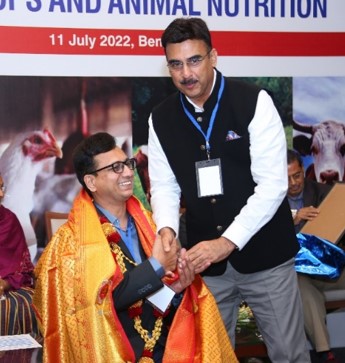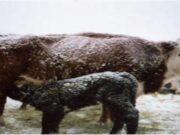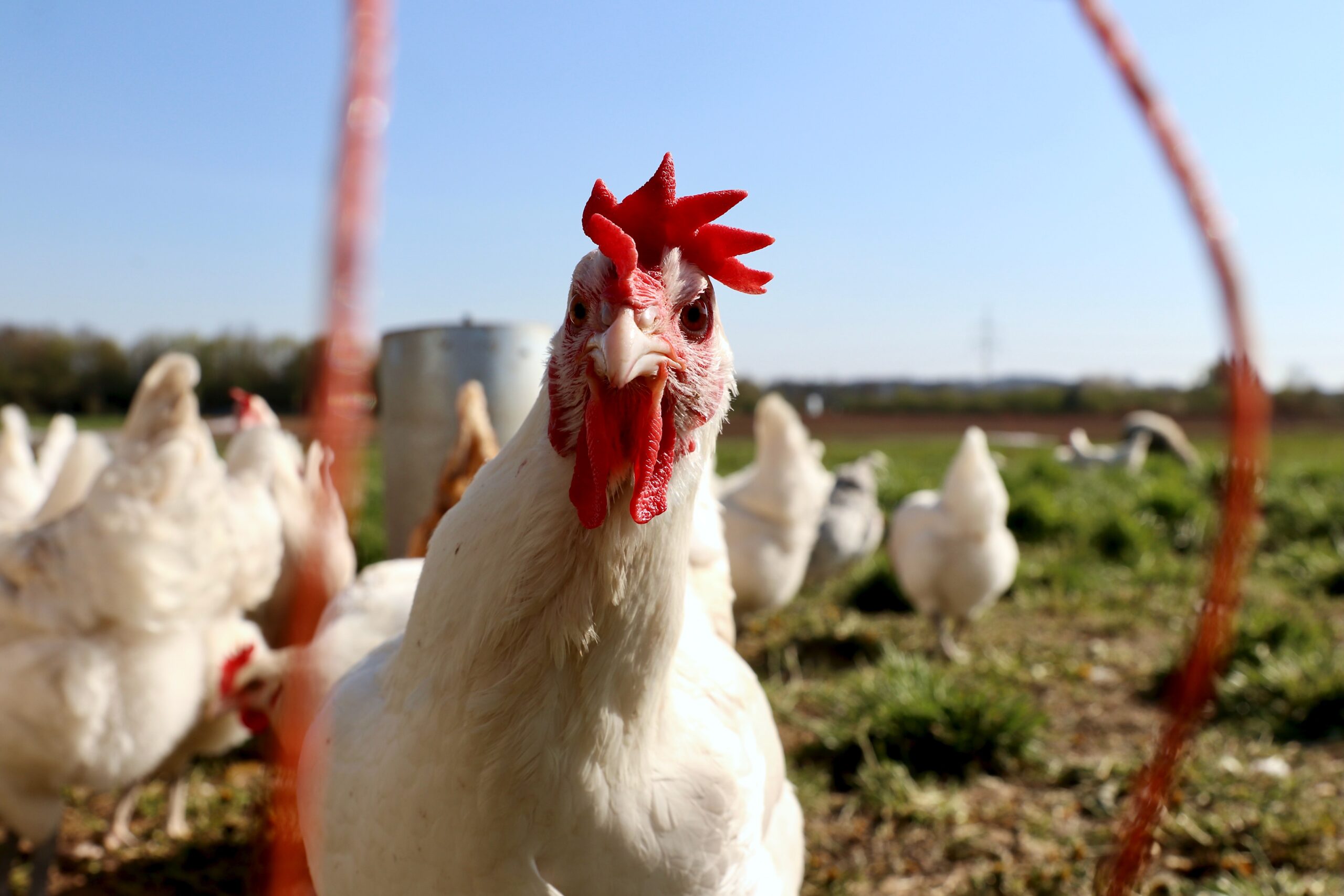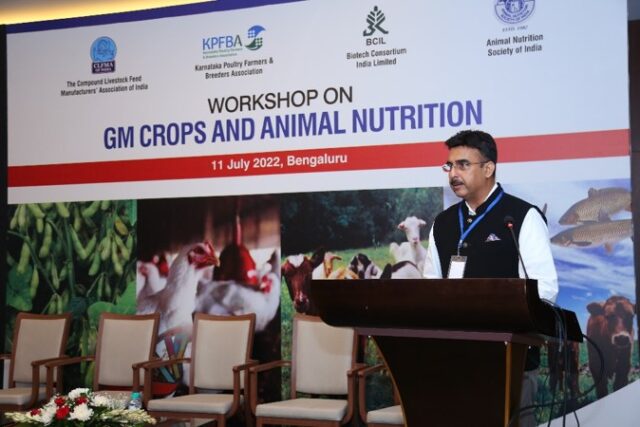
India needs to adopt GM crops soon to increase production and lower costs, while ensuring safety: Experts
With adoption of genetically modified (GM) crops in India having hit a roadblock, Dr. Lalitha Gowda, who is the Chair of the Scientific Panel of GM-Foods, FSSAI, and member of GEAC (Genetic Engineering Appraisal Committee) said any regulation that needs to be implemented has to be first safe for human and animal consumption.
She was participating in a panel discussion on ‘Making livestock industry competitive: way forward’, organized jointly by the Karnataka Poultry Farmers and Breeders Association (KPFBA); the Compound Livestock Feed Manufacturers Association of India (CLFMA); the
Biotech Consortium India Ltd; and Animal Nutrition Society of India.
Thorough protocols need to be followed
Dr. Gowda said that there are well-laid-out protocols in line with Codex Standards and they take time, not just in India, but in the developed parts of the world. While agreeing that GM crops had benefits, she said they had to go through proper appraisals before going
commercial. Regarding processed GM derivatives for feed, she said that a simplified procedure is considered sufficient as they are not living modified organisms.
Presently in India, only Bt Cotton is allowed as GM crop, while brinjal and mustard are awaiting approvals for quite some time now.
Demand for protein will increase exponentially
Mr. Neeraj Kumar Srivastava, Chairman of Compound Livestock Feed Manufacturers Association of India (CLFMA) said India would be at the centre of increased meat demand, and close to 50% meat is going to be produced in Asia, thus opening up enormous opportunities for the livestock sector. India is number one in milk production and millets, number two in wheat, and number four in broiler production, however, the protein demand and supply to the growing population is inadequate.
India, he said, needs 25 to 30 million metric tonnes of protein of which only about 47% is supplied through internal sources. As there are limitation in increasing yield of agricultural crops, he stressed for need for GM crops to increase productivity and meet demand. India’s
per capita availability of livestock is low and it has one of the lowest protein-consuming population. The demand for protein will continue to increase in view of the expanding middle class, with changing lifestyle patterns, urbanization, and other consumer-driven market trends. Though poultry numbers have grown more than 500 percent in the last couple of years, there is a need to increase output.
GM crops can overcome shortage of feed
Dr. K.C.Veeranna, Vice Chancellor, Karnataka Veterinary, Animal and Fisheries Sciences University said cost of production of livestock is going up every day as the major contributor is feed. The biggest challenge is to reduce cost of production and make products which are
rich in protein easily available. In this background, only GM crops and derivatives could help overcome shortage of feed. Stating that fodder resources were limited as land available for fodder is decreasing, there was need to utilize technologies to meet animal nutrition needs.
Dr. S.Rajendra Prasad, Vice Chancellor, University of Agricultural Science, Bangalore, said with India’s population growing at a fast pace, it was urgent to focus on nutritional security of both human beings and animals. India produces 308 million metric tons of foodgrains
and 329 mmt of vegetables and fruits, but this is going to be highly insufficient to meet the demands of growing nation.
Dispelling myths about safety of GM crops
Dr. Vibha Ahuja, Chief General Mnager, Biotech Consortium India Limited, said it was necessary to permit the use of GM crops and its derivatives as it would help in increasing the availability of feed and feed ingredients in India. It is imperative to make available sufficient low cost and good quality feed for sustainable growth of poultry, dairy, aqua and other livestock sectors.
On the many myths that surrounded GM crops, Ms. Ahuja reiterated that reviews by major scientific bodies and regulatory agencies have confirmed that GM crops and the food derived from them are safe. The only difference between the GM crops and their non-GM counterparts is the proteins expressed by inserted genes. The safety of the consumption of these proteins is established based on biological properties and tests of digestibility, acute toxicity, and allergenicity. Once this is done and safety established then the compositional
equivalence confirms that the GM crop/food is similar to the corresponding non-GM which has been used/consumed traditionally for generations and hence no long-term effects are expected to be seen based on this history of safe human use.
‘More from less’, not less from more’ is going to be the mantra
Dr. Mahesh. P.S. Joint commissioner GoI and Director of Central Poultry Development Organisation & Training Institute said that due to climate changes, the planet is challenged by the demand of protein, the demand of energy, the demand of population, etc., and that the era of less from more is over now and that we need to work on ‘more from less’, referring to land availability.
Talking about GM, he wondered how people accepted milk from the cow which was eating BT cottonseed, a GM derivative, but were not ready to accept any other GM products, calling for severe extension work.
India can export to Gulf having logistical location advantage
Mr. Naveen Pasuparthy, Treasurer, CLFMA of India said presently corn and soya have major inputs controlling poultry costs. Yield per acre of both crops is too low and GM is the only solution to increase yield as well as income for farmers. Excessive usage of pesticides, herbicides, etc have been affecting the genetic capabilities of animals that feed on such crops.
He said that there was enormous potential for exports if we could get sufficient and cost-effective inputs made available through GM technology. He talked about how India was just four hours away from Gulf and could supply easily, being a logistically located hub, unlike
Brazil and other South American countries which were supplying livestock to the Gulf and would be challenged by high fuel prices in the years to come.
Dr. M.S.Sheshshayee, Professor and Head, Department of Crop Physiology, University of Agricultural Sciences, Bengaluru said the mantra has been to produce more from less, more crop per drop, more grain per rain, and the use of GM Technologies can help in achieving the
same. Talking about proteins, he said Indians get nearly 70% of proteins from cereals but that is not sufficient and the contribution of livestock is immense.
Need to convince NGOs and educate farmers
Dr. Devegowda, President of Institution of Veterinarians of Poultry Industry (IVPI) said that there was an urgent need to convince non-governmental organizations which are opposing GM crops and also educate the farmers on the benefits of GM. India needs GM to feed the
growing population, both human and livestock.
Trade has to happen for quicker adoption of GM
Amit Sachdev, Regional Consultant, South Asia, US Grains Council, said trade needs to happen and mentioned that US and India had signed an agreement in 2021, allowing import of Alfalfa for the dairy industry. Underscoring the importance of GM crops, he said there
was no other go, but to adopt as they were safe, cheaper, and were going to be easily available in the world market.
Calculating nutrient value leads to improved productivity
Susil Silva, Head, Animal Utilization, South Asia, US Soybean Export Council informed the about “Nutrient Value Calculator” to the participants. He explained key features of the tool and explained how it can be used for calculating the nutritional value of feed and can contribute to
improved productivity.
Dr. N.K.S.Gowda, Principal Scientist, ICAR-National Institute of Animal Nutrition and Physiology also spoke about the nutritional value of animal feed.
Dr. Sushanth Rai, President, Karnataka Poultry Farmers & Breeders Association said the demand for animal feed for poultry, dairy, etc is growing and that soaring prices affected the sector. India needs to import soybean by September to tide over the feed crisis, while there
is an urgency to produce more and GM was the only answer.
On the occasion, Mr. Inayath Ulla Khan, Executive Secretary, KPFBA was conferred with the Prof.G.Devegowda Poultry Science Excellence Award 2022 instituted by Pashudhan Praharee. Mr. Khan was honored for the yeomen service he has rendered to the poultry sector in general and KPFBA in particular.
Mr. Khan proposed a vote of thanks.

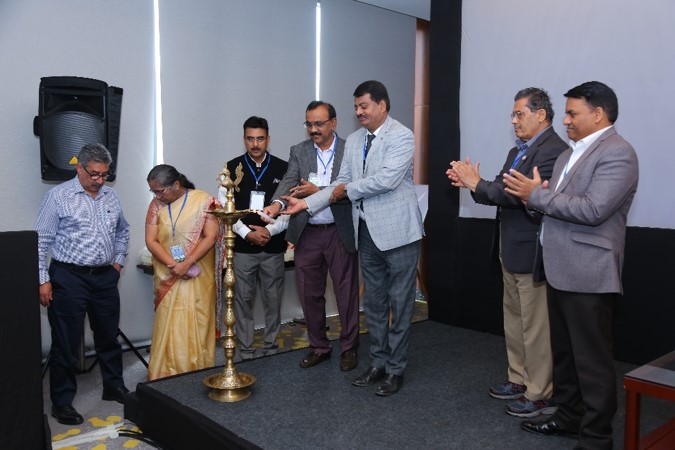
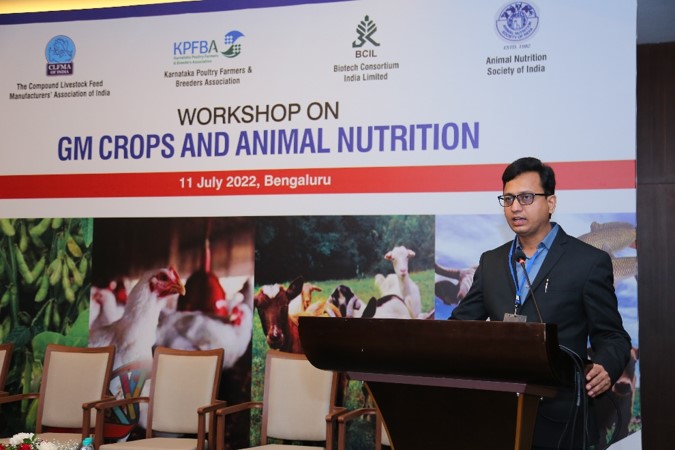
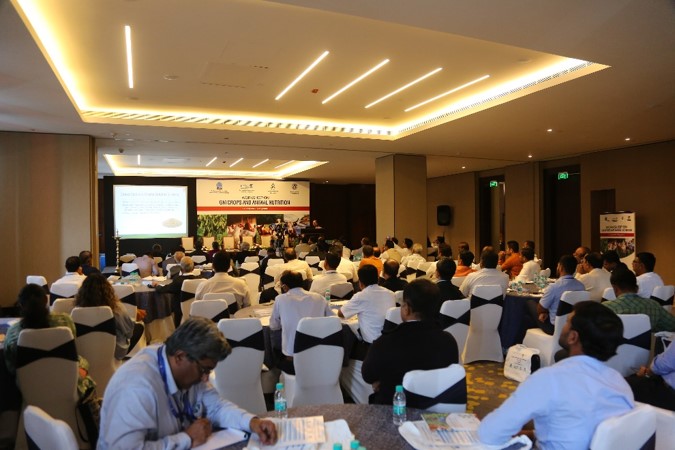
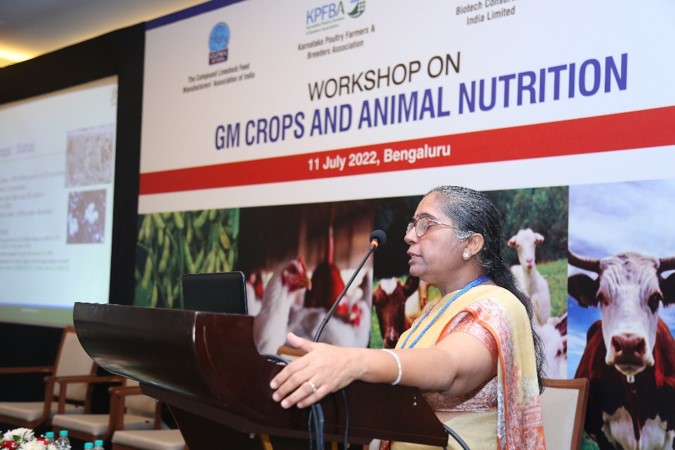
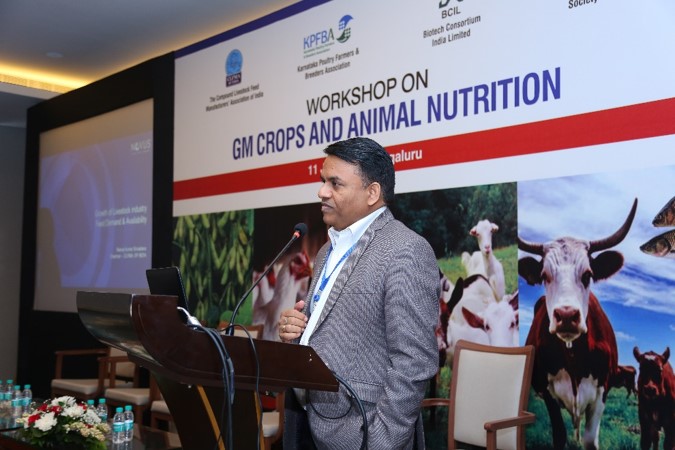
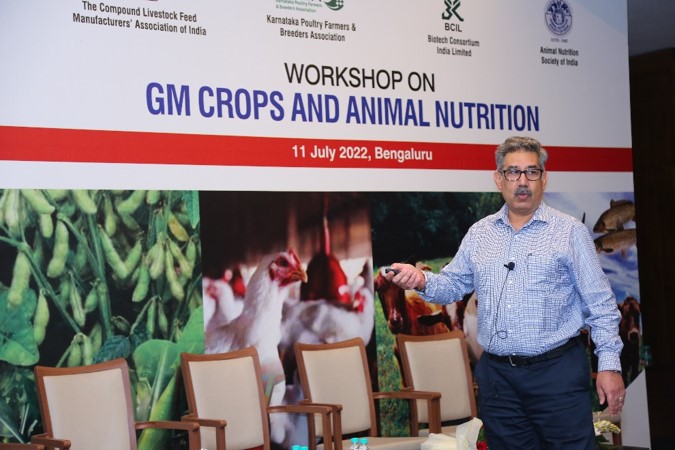
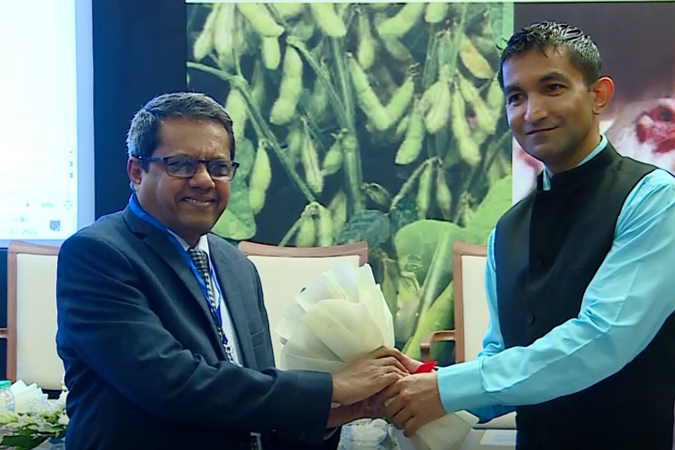
Nutrient Value Calculator: A tool for feed quality check
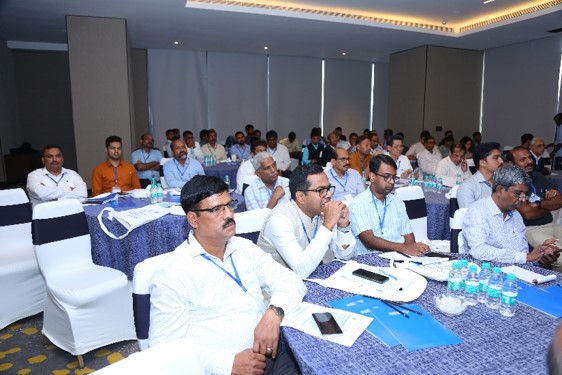
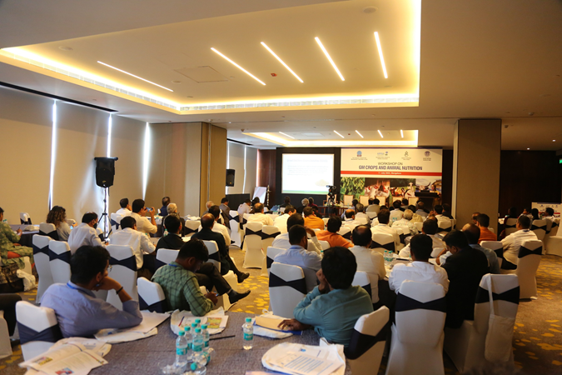
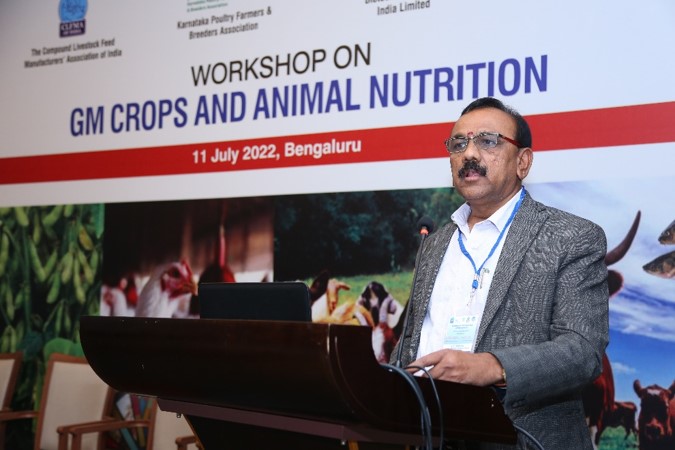
Karnataka Veterinary, Animal and Fisheries Sciences University, Bidar
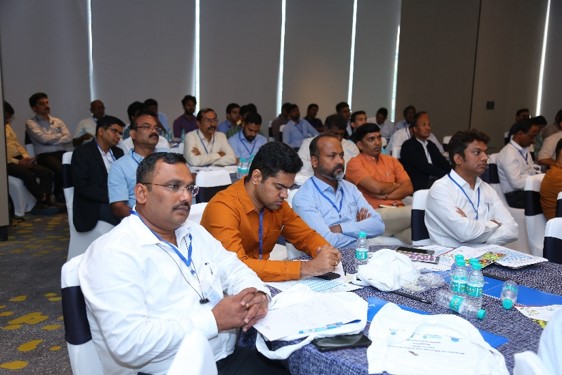
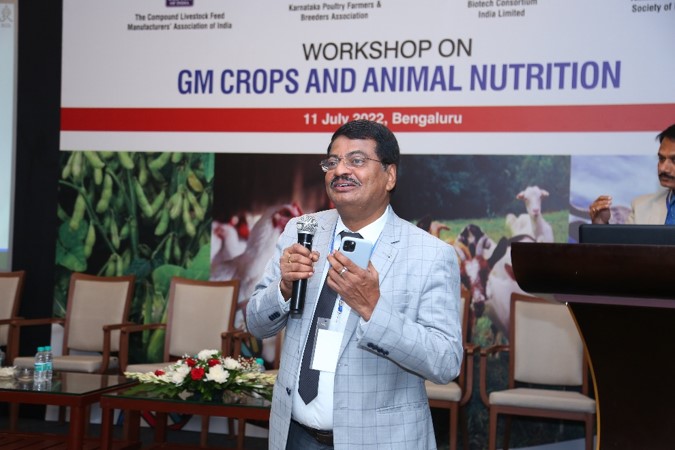
Agricultural Science, Bangalore
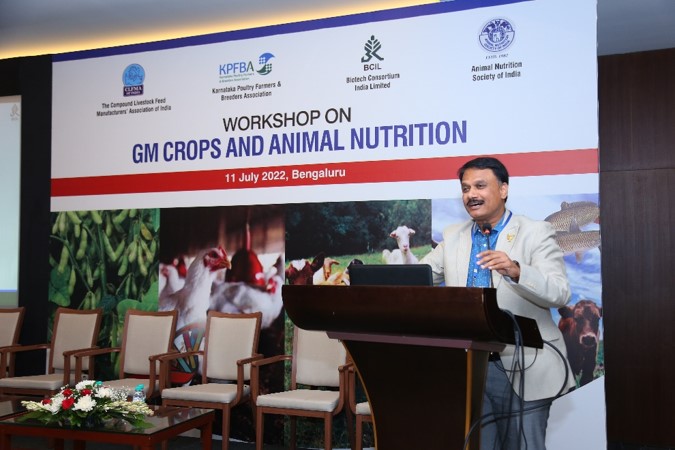
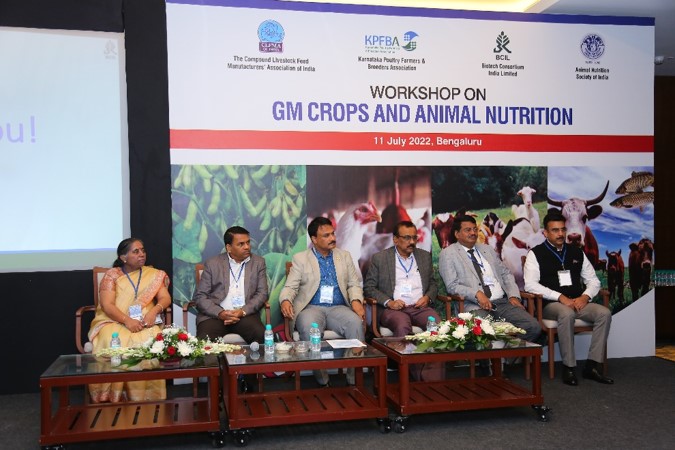
[ L-R: Dr. Vibha Ahuja,CGM-BCIL, Mr. Neeraj Kumar Srivastava, Chairman-CLFMADr. P.S Mahesh, Joint commissioner GoI and Director CPDO&TI, Dr. K.C Veeranna, Vice Chancellor -KVAFSU, Dr. S.Rajendra Prasad, Vice Chancellor, University of Agricultural Science, Bangalore and Dr. Sushanth Rai.B, President, KPFBA
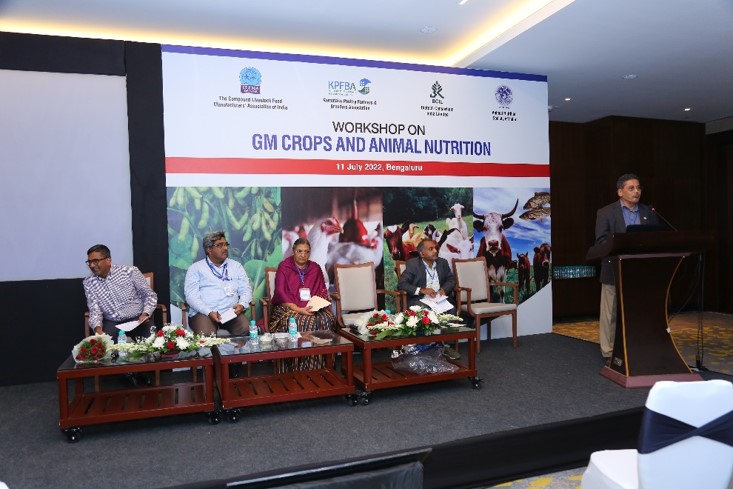
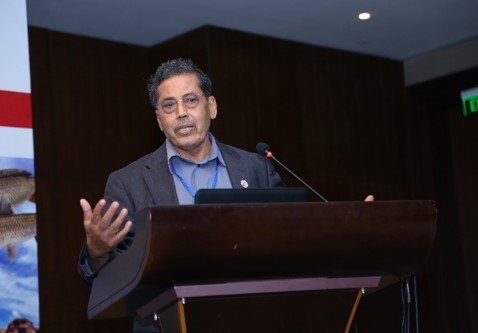
Institution of Veterinarians of Poultry Industry
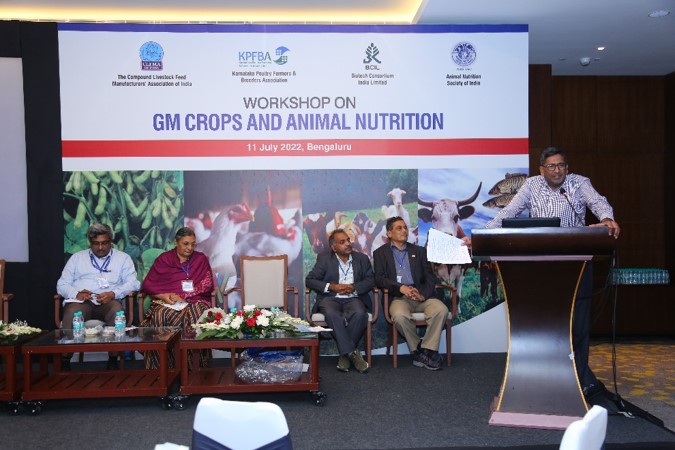
[L-R: Dr. M.S. Sheshshayee, Professor and Head, Dept of Crop Physiology, UASB, Dr. Lalitha Gowda, Chair, Scientific Panel on GM-Foods, FSSAI, India; Member, GEAC and Former Chief Scientist, CFTRI, Mysore, Dr. N. K. S. Gowda. Principal Scientist. ICAR-NIANP, Dr. G. Deve Gowda, President, IVPI, and Mr. Naveen Pasuparthy, Treasurer, CLFMA of India]
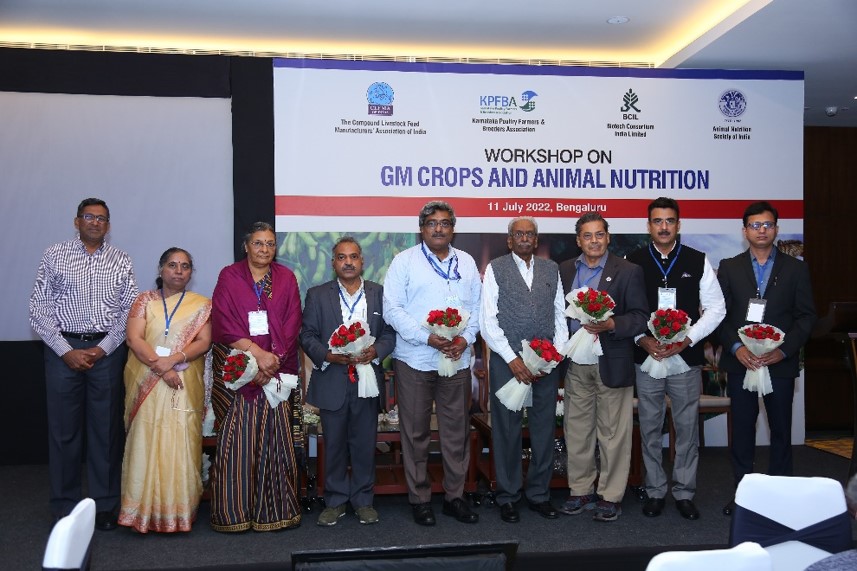
L-R: Mr. Naveen Pasuparthy, Treasurer, CLFMA of India, Dr. Vibha Ahuja, CGM-BCIL, Dr. Lalitha Gowda, Chair, Scientific Panel on GM-Foods, FSSAI, India; Member, GEAC and Former Chief Scientist, CFTRI, Mysore, Dr. M.S. Sheshshayee, Professor and Head, Dept of Crop Physiology, UASB, Mr. P.S Nanda Kumar, Honb;e Past President, KPFBA, Dr. G. Deve Gowda, President, IVPI, Dr. N. K. S. Gowda. Principal Scientist. ICAR-NIANP, Dr. Sushanth Ra. B, President – KPFBA and Mr. Inayath Ulla Khan, Executive Secretary – KPFBA
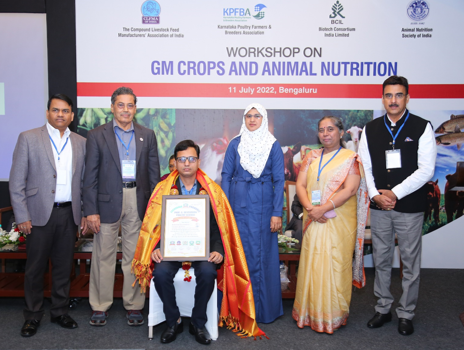
L-R: Mr. Neeraj Kumar Srivastava, Chairman-CLFMA, Prof. G. Devegowda President, IVPI, Mr. Inayath Ulla Khan, Executive Secretary – KPFBA, Mrs. Shabreen Begum Khan, Dr. Vibha Ahuja, CGM- Biotech Consortium India Limited (BCIL) and Dr. Sushanth Rai.B, President, KPFBA.
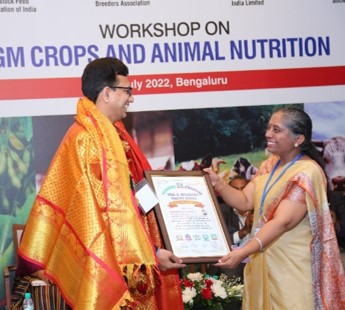
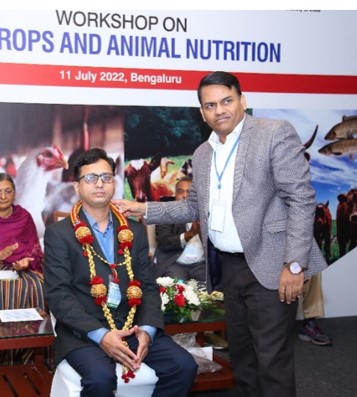
Mr. Inayath Ulla Khan
